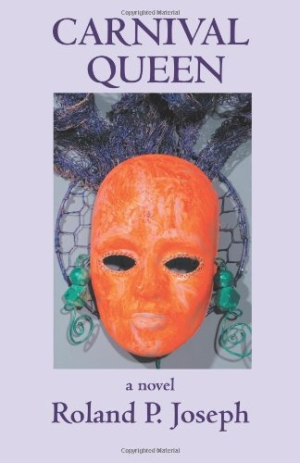Carnival Queen
Regrets of the past and desires to override the mistakes of youth—themes commonly explored in fiction—are the controlling elements in Roland P. Joseph’s Carnival Queen. Set against the lush landscape of Trinidad, this soul-searching novel probes the depths of a woman’s heart as she comes to realize that the passing of forty-five years does not establish a sense of accomplishment when the inner psyche longs for what has been lost.
Annabelle Castello is a beauty queen who moved to Port-of-Spain, where she placed superficial interests above meaningful existence, married the wrong person (a man forty years her senior), and relinquished custody of a daughter she conceived with her real love, Ricardo. She returns to her hometown of Bristol Village to reunite with Ricardo, only to discover he has recently died.
The author describes a tragic—and ominous—scene at the cemetery as Annabelle begs to see Ricardo’s face one last time: “The gravediggers resumed their task of throwing dirt into the grave with added haste as though to deter any notion by the pastor to accede to the woman’s request. But the pastor gently removed the woman’s arms from his shoulder and in a soft, compassionate tone, whispered, “I’m so sorry, madam, but you’re too late.”
Joseph’s enlightening story explores the lives of secondary characters, jumping into previous decades to provide insights into generational differences and how the actions of relatives influence family dynamics. This flashback technique verges on the disorienting.
Early in the book, the plot takes an excursion back to the forties, providing a glimpse of Annabelle’s father. As his dismal life progresses, frank discussion of his attempt to acquire the deed to property by engaging in a relationship for monetary reasons only, and by his cold-hearted example, sets the tone for his daughter’s poor judgment in adulthood. She chooses to neglect her own needs to pursue a “sensible” arrangement. Rather than seeking romantic or sexual attraction, she adheres to a much older man’s so-called stable environment, similar to her father’s acceptance of a marital transaction that would lead to financial gain: “Annabelle, as he had named her, was born some nine or ten years after George’s coerced marriage. George could not muster up the urge to sleep with his wife… The marriage was consummated a few years after they were married.”
A resident of Trinidad and Tobago, Roland P. Joseph is a writer and artist. Carnival Queen is his second publication, following a short-story collection. His work is enriched by the culture and social milieu of his native land.
The underlying, symbolic message of arriving too late or missing the boat permeates this sad novel about a woman’s broken dreams haunting her restless life. Fans of Nicholas Sparks may find Joseph’s style appealing.
Reviewed by
Julia Ann Charpentier
Disclosure: This article is not an endorsement, but a review. The publisher of this book provided free copies of the book and paid a small fee to have their book reviewed by a professional reviewer. Foreword Reviews and Clarion Reviews make no guarantee that the publisher will receive a positive review. Foreword Magazine, Inc. is disclosing this in accordance with the Federal Trade Commission’s 16 CFR, Part 255.

